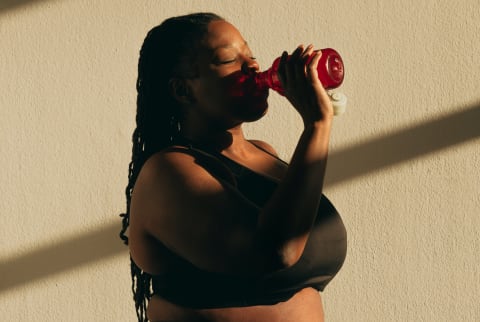If you’ve ever taken the Myers-Briggs Type Indicator (MBTI), you’re probably aware that whatever “type” you fall under can have some implications for your compatibility with others. Whether you’ve got your eye on someone special, or you just want to know for future reference, here are the two type combinations that are likely to be compatible in romantic relationships, according to research.
The MBTI compatibility combinations to look for.
There are two specific MBTI combinations that have indicated a greater than 70% chance of compatibility in research, according to board-certified clinical psychologist Kristina Hallett, Ph.D., ABPP.
Those are if two people are both sensing/judging types (ESTJ, ESFJ, ISTJ, or ISFJ) or if they are both intuition/feeling types (ENFP, INFP, ENFJ, or INFJ).
In other words, if you and your partner both have an S and J in your MBTI type, or if you both have an N and F in your types, then there’s at least a 70% chance that you’re a good romantic fit.
What does that actually mean?
Let’s start by explaining the SJ pair. Those who have the S (for sensing) in their MBTI type, Hallett notes, are often factual and detail-oriented when it comes to how they gather and process information. And the J (for judging) means someone who appreciates structure, schedules, and clear expectations when it comes to how they approach life.
According to Hallett, people who have both S and J are “overall more grounded in reality, more fact-based, and have a more ‘logical’ approach,” and two people who share this approach to life are likely to be compatible.
As for the NFs, the N (for intuition) is given to people who lean more toward abstract thinking and interpretation when gathering information, Hallett says. The F (for feeling), similarly, revolves around people who are more drawn to the realm of emotions, relationships, and values. Two people with both N and F would also likely be compatible based on this research.
An NF person “is going to have an easier time understanding and connecting with someone else who is also able to use and rely on feelings, connection to others, and big-picture thinking,” Hallett explains.
While compatibility ultimately comes down to the two specific individuals and how they approach relationships, personality tests like the MBTI offer us research-backed clues into who we could be most compatible with. If you and your partner are both sensing and judging, or if you’re both intuitive and feeling, consider those similarities a good sign.
Hallett adds that, in general, having at least two of the letters in common is a good sign. And that makes sense: In general, people may be more likely to be compatible with those who share at least some similar personality traits to themselves.
Want to turn your passion for wellbeing into a fulfilling career? Become a Certified Health Coach! Learn more here.








